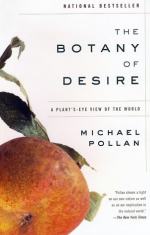
|
| Name: _________________________ | Period: ___________________ |
This quiz consists of 5 multiple choice and 5 short answer questions through Chapter 3.
Multiple Choice Questions
1. In the book, Pollan was almost caught by the police for growing a couple of ______ plants on his property.
(a) Marijuana.
(b) Poppy.
(c) Datura.
(d) Morning glory.
2. Chinese poets likened the blossoms of the peony to a ______.
(a) Bee's sexual organs.
(b) Woman's sexual organs.
(c) Elephant's sexual organs.
(d) Man's sexual organs.
3. The apple does not breed simply from seed. Thus all trees that produce the same type of apples are _______ of the original tree.
(a) Roots.
(b) Seeds.
(c) Clones.
(d) Leaves.
4. The apple was first introduced to North America with the initial waves of the ______ immigration.
(a) Canadian.
(b) Middle Eastern.
(c) European.
(d) Mexican.
5. The author speculates that in order to transcend the normal day experience, we may need to a single volume of knowledge, which is a natural history of the __________.
(a) Workforce.
(b) Plant world.
(c) Spirit.
(d) Imagination.
Short Answer Questions
1. The Greeks believed that true beauty was the offspring of form and ecstasy personified in ______ and Apollo.
2. Pollan suggests that on a biochemical level, psychoactive plants affect the brain much the way that the following activities except ______ affect it.
3. The book states that the potato plant was stolen from the royal gardens of ______.
4. _______ is a social ritual of sanctioned craziness and release. It is a way for the community to temporarily indulge its Dionysian urges.
5. ________ was an American Pioneer and introduced the apple in the Midwestern United States.
|
This section contains 247 words (approx. 1 page at 300 words per page) |

|




